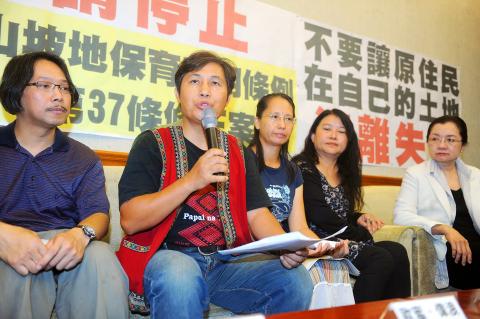Aboriginal activists yesterday urged lawmakers to withdraw a proposed revision of the Act for the Utilization and Transfer of Reserved Mountainous Land (山坡地保育利用條例), which would alter a pending period that currently allows Aborigines to secure the ownership of reserve lands, warning that the planned change could accelerate the loss of Aboriginal lands to developers.
Article 37 of the law stipulates that Aborigines may obtain the right to farm or rent reserved mountainous lands and if an Aborigine legally uses the plot of land for five consecutive years he or she may be granted ownership of the land.
Chinese Nationalist Party (KMT) Legislator Jeng Tian-tsair (鄭天財) of the Amis tribe has proposed deleting the five-year pending period from the article, causing many people to be concerned.

Photo: Liao Chen-huei, Taipei Times
“If the proposed revision is passed, it would be a disaster for us, because it would make it easier for large developers to get hold of Aboriginal reserve land by borrowing Aboriginal names,” said Liu Mei-ling (劉美玲), an Atayal Aborigine from Hsinchu County’s Guansi Township (關西).
“There are a lot of large-scale development projects in Atayal undertaken by non-Aborigines; there are hot spring resorts, coffee shops and hotels, but Aborigines can only work there as janitors, making between NT$18,000 and NT$20,000 a month,” Lin said.
Lin Chang-mau (林長茂), of the Green Formosa Front, said he has witnessed numerous cases in which Aborigines lent their identity to non-Aboriginal developers for between NT$200,000 anmd NT$300,000 so developers can then use the land as collateral for loans worth tens of millions of NT dollars.
“Many Aborigines became indebted because of this. Some ended up becoming homeless because they are too afraid to go home and some have even committed suicide,” Lin said.
Hoyi Ciku, an Atayal pastor from Renai Township (仁愛) in Nantou County, urged all Aborigines to protect their lands and called on the government to actively launch a probe into the illegal use of Aboriginal lands.
“Instead of proposing a relaxation to the restriction now, Aboriginal lawmakers should pass subordinate laws to the Aboriginal Basic Act (原住民族基本法) to better protect Aboriginal lands,” Hoyi said.
Jeng, the amendment’s leading advocate, said he made the proposal because he believed it is not fair that there is no five-year restriction for non-Aborigines, but there is one for Aborigines.
KMT Legislator Kung Wen-chi (孔文吉) of the Seediq tribe agreed.
“Actually, I also support the activists’ idea that non-Aboriginal developers should not get hold of Aboriginal lands, but restricting Aboriginal rights to land ownership is not the way to solve the issue,” Kung said. “The target should be developers, not Aboriginal landowners.”

A Taiwanese software developer has created a generative artificial intelligence (AI) model to help people use AI without exposing sensitive data, project head Huang Chung-hsiao (黃崇校) said yesterday. Huang, a 55-year-old coder leading a US-based team, said that concerns over data privacy and security in popular generative AIs such as ChatGPT and DeepSeek motivated him to develop a personal AI assistant named “Mei.” One of the biggest security flaws with cloud-based algorithms is that users are required to hand over personal information to access the service, giving developers the opportunity to mine user data, he said. For this reason, many government agencies and

The National Fire Agency on Thursday said a series of drills simulating a magnitude 8.5 earthquake would be held in September to enhance the government’s emergency response capabilities. Since earthquakes cannot be predicted, only by continuously promoting disaster prevention measures could Taiwan enhance its resilience to earthquakes, agency Director-General Hsiao Huan-chang (蕭煥章) said in a news release. The exercises would be held to mark annual National Disaster Prevention Day on Sept. 21, the aim of which is to test Taiwan’s preparedness and improve its earthquake resilience in case of a major temblor, Hsiao said. As part of those drills, an earthquake alert would

DEFENSE: The National Security Bureau promised to expand communication and intelligence cooperation with global partners and enhance its strategic analytical skills China has not only increased military exercises and “gray zone” tactics against Taiwan this year, but also continues to recruit military personnel for espionage, the National Security Bureau (NSB) said yesterday in a report to the Legislative Yuan. The bureau submitted the report ahead of NSB Director-General Tsai Ming-yen’s (蔡明彥) appearance before the Foreign and National Defense Committee today. Last year, the Chinese People’s Liberation Army (PLA) conducted “Joint Sword-2024A and B” military exercises targeting Taiwan and carried out 40 combat readiness patrols, the bureau said. In addition, Chinese military aircraft entered Taiwan’s airspace 3,070 times last year, up about

STRICTER ENFORCEMENT: Taipei authorities warned against drunk cycling after a sharp rise in riding under the influence, urging greater public awareness of its illegality Taipei authorities have issued a public warning urging people not to ride bicycles after consuming alcohol, following a sharp rise in riding under the influence (DUI) cases involving bicycles. Five hundred and seven people were charged with DUI last year while riding YouBikes, personal bicycles, or other self-propelled two-wheelers — a fourfold increase from the previous year, data released by the Taipei Police Department’s Traffic Division showed. Of these, 33 cases were considered severe enough to be prosecuted under “offenses against public safety,” the data showed. Under the Road Traffic Management and Penalty Act (道路交通管理處罰條例), bicycles — including YouBikes and other